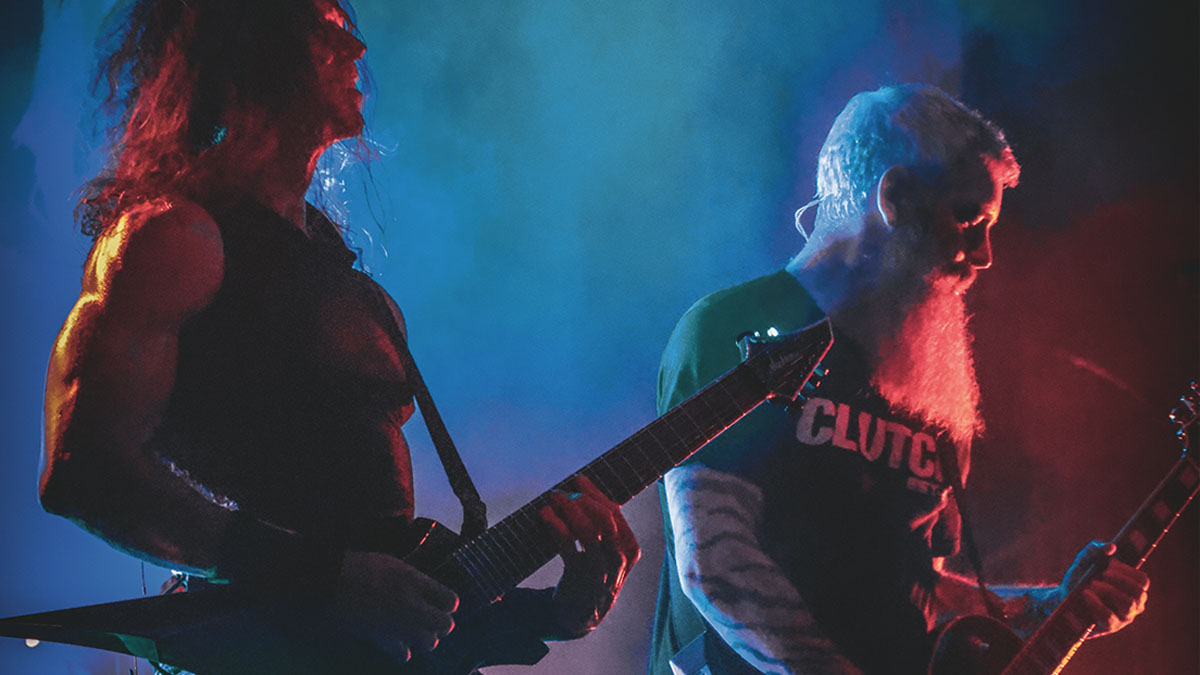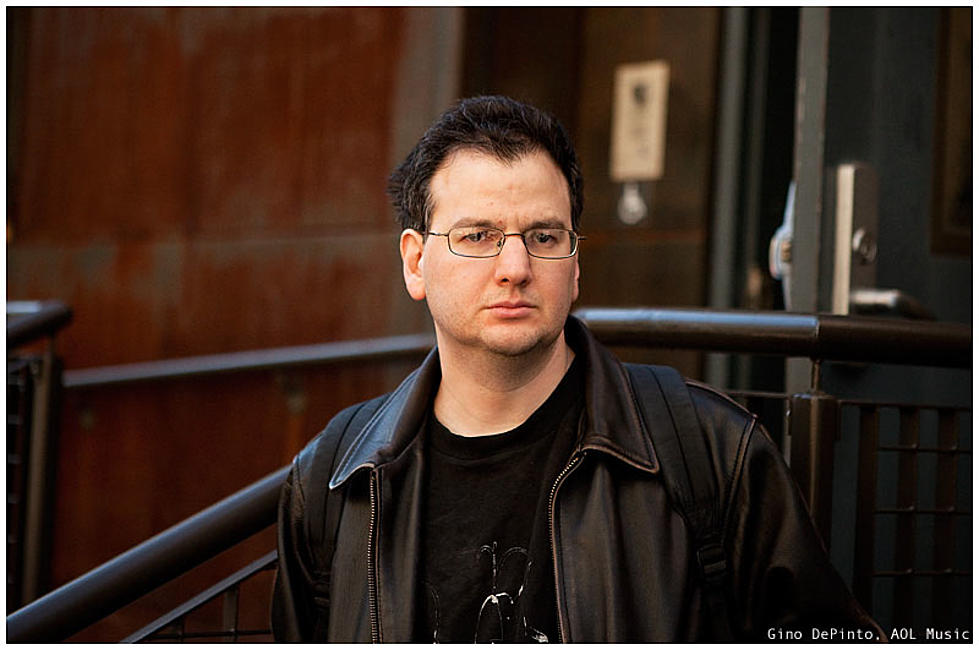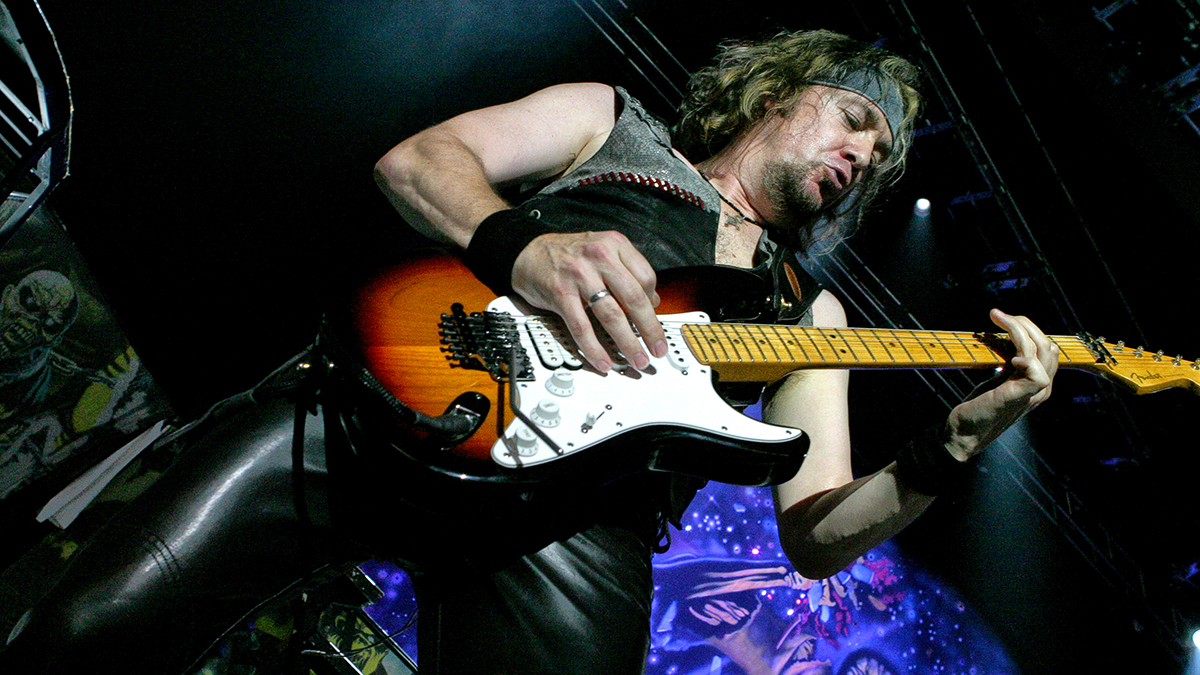“As soon as we heard Chris’ name, I knew we were good. Nobody works harder or learns songs quicker. It was like I had my teacher with me every day”: How ex-Megadeth shredder Chris Broderick lit the fuse under In Flames’ fierce return
With Broderick's virtuoso seven-string dovetailing with Björn Gelotte's down-tuned six-string, Foregone is the sound of In Flames taking their sound faster, heavier, and wherever the ideas took them

When they surfaced from the darkened streets of Gothenburg, Sweden, in 1990, In Flames were among the pioneers of Swedish melodic death metal, combining the speed of fellow countrymen Dismember and Entombed with the guitar harmonies of Iron Maiden and Judas Priest, injecting the genre with a newfound virtuosity that inspired scores of other acts, including American metalcore bands like Killswitch Engage and Unearth.
By the early 2000s, however, In Flames weren’t blazing quite as brightly. They slowed down their songs, curbed their aggression, incorporated more melody and drew from elements of alternative rock and industrial, causing many of their early fans to jump ship.
In Flames didn’t care. They enjoyed playing death metal for about 10 years, then became more inspired by other, more experimental types of metal. That’s exactly what they delved into between 2002 and 2019 – and in the process, they attracted a larger fanbase.
“We’ve always been lucky enough to do whatever the fuck we wanted,” says guitarist and main songwriter Björn Gelotte. “We don’t ever go into an album with anything in mind, but we decided early on that we never want to repeat ourselves, and we’ve had the opportunity to make so many records, so we’ve always tried to make the process interesting and challenging.”
The follow-up to 2019’s I, the Mask marks yet another departure – at least it’s a departure from the commercial metal they’ve written over the past 17-plus years; Foregone, the band’s 14th full-length studio album, is fast and frenzied – pretty comparable to the melodic death metal In Flames released in the late ’90s.
Foregone isn’t exactly a return to form, since there are still clean vocals and the songs are more structured than those on the band’s first five records. At the same time, fans who have missed the savagery and velocity of 1997’s Whoracle and 2000’s Clayman should be thrilled with the rapid tempos, buzzsaw riffs and fleet-fingered leads of Foregone.
“I don’t think that the difference in the songwriting is necessarily that extreme; it’s more a matter of how we packaged and arranged the songs,” Gelotte says. “I’ve always enjoyed fast songs, and as we were going along on this album, we liked the big, heavy stuff we were coming up with and decided we should make something heavier and more metal sounding than the previous couple of records.”
All the latest guitar news, interviews, lessons, reviews, deals and more, direct to your inbox!
We liked the big, heavy stuff we were coming up with and decided we should make something heavier and more metal sounding than the previous couple of records
Foregone marks the In Flames recording debut of lead guitarist Chris Broderick (ex-Megadeth, Act of Defiance), who has played live with the band since 2017, when Niclas Engelin left. And while all the rhythm parts on the album were written and played by Gelotte, Broderick’s multi-faceted, neo-classical and technical thrash-based runs provide a welcome contrast to Gelotte’s slower, more hook-laden solos.
As In Flames gear up for the summer festival season, Gelotte and Broderick discuss Broderick’s leap into the Flames, how his seven-string guitar blends with Gelotte’s six-string, the obstacles the band navigated while making Foregone, and why Gelotte hates being in the studio.
Did writing Foregone take you back to the late ’90s, when you released the Gothenburg melodic death metal classics Colony and Clayman?
Björn Gelotte: “Not much, because how I write and arrange are so different now compared to how I did things back then. I like to think everything through these days, and we didn’t do that in the beginning. It was full-on riff after riff without much thought about structure or even how to be able to recreate it live.
“Chris [Broderick] is obviously a wizard, so it didn’t take him long to learn those older songs that we still play. But sometimes I don’t understand the arrangements anymore and I have to work hard to play them because they almost sound wrong to me now.”
It was full-on riff after riff without much thought about structure or even how to be able to recreate it live
Björn Gelotte
Was this new level of aggression on Foregone a reflection of surviving the pandemic and creating music during a period of fear and instability?
Gelotte: “Perhaps it was. I didn’t think about it at the time. I was just writing what came to me. But I think I was fueled by the frustration not just of the world turning upside down, but of not being onstage.
“Playing live is my absolute favorite thing – not recording. Recording sucks. It’s hard work, and I’m not in a band for the hard work. I’m there to enjoy myself doing shows. And that was all gone for two years. So, in hindsight, that might have been part of the reason for the level of intensity in the songs.”
Chris, were you an In Flames fan before you joined?
Chris Broderick: “I grew up in this hole in Colorado, so I wasn’t exposed to a lot of different kinds of metal. I just heard what they played on the radio. But when I was touring with Jag Panzer, [the label] gave us access to the warehouse and I was looking at all these shelves full of CDs.
“The first one I picked up was In Flames. That was my first exposure to Scandinavian metal. And from that, I discovered At the Gates, Meshuggah and Scar Symmetry, and that all became a big influence.”
To me, they were the cool guys on the tour. I was a dorky nerd playing my guitar and they were this happening band
Chris Broderick
Were you able to incorporate any of the chops you learned from Swedish metal into Megadeth?
Broderick: “I think everything you like can’t help but influence you. It was never an intent, but you internalize it, and it becomes part of your personality.”
When did you first meet In Flames?
Broderick: “They toured with Jag Panzer and Iced Earth in 2002. To me, they were the cool guys on the tour. I was a dorky nerd playing my guitar and they were this happening band. We got to know each other, and then when they would come through town, I’d go see them and we hung out and became friends.”
Did they ask you to join or did you call them when Niclas Engelin left the band?
Broderick: “In the beginning of 2019, I heard through a friend that In Flames needed a guitarist to fill in on tour. They asked me if I’d be interested. I thought it would be awesome. I would get to tour with my friends who I haven’t seen in a long time. It came together very fast, and everything took off from there.”
Vocalist Anders Friden told Sticks for Stones that Engelin “had to stay home to deal with some personal things” and called you “48 hours before [you] had to leave, and he went to the hospital.” More recently, in June 2023, bassist Paul Bryce Newman, who joined in 2017, quit and was replaced by ex-Dillinger Escape Plan’s Liam Watson. Why so much turnaround?
Gelotte: “In Flames has always been an awesome band to tour with when people are at 100 percent. But as soon as that feeling is not the same anymore, it starts to deteriorate. There’s obviously so many layers to everything, but I’ll just say that you can’t force somebody to tour, right? So even though the situation was shitty, we came out stronger in the end because now we don’t have any negative feelings about anything anymore. We’re all out there knowing we’re doing this together.”
You seem level-headed about the situation, considering how Niclas left you in the lurch. Do you think he’s as accepting of what happened?
Gelotte: “I will not speak for Niclas, but it was a difficult situation because not only is it something involving a work colleague, it’s something with a friend. You share so much together when you’re in a band. That part will always be really, really hard to think about. But if you look at it from a musical perspective, I would say we’re in a better place, playing-wise. Vibe-wise, everything is for the better.”
As soon as we heard Chris’ name, I knew we were good. ’Cause I know of nobody who works harder and has the ability to learn songs quicker than Chris
Björn Gelotte
Did you have a lightning round of auditions to find a full-time replacement for Niclas?
Gelotte: “There wasn’t time. We were really in a weird place because the tour was not only announced, it was already on. Our crew was in the U.S., and we were getting ready to fly over. We didn’t know what to do since we are a two-guitar band. We talked to management, and they gave us a couple of names of people that were available.
“As soon as we heard Chris’ name, I knew we were good. ’Cause I know of nobody who works harder and has the ability to learn songs quicker than Chris. And that developed into a really cool relationship for me because it was like I had my teacher with me, and I learned so much from him every day.”
What has Chris taught you?
Gelotte: “Just stuff about technique, warmup routines, different ways to do things. I’m not a natural lead guitarist and he’s a master. He picked up the songs so quickly, we developed our own versions of them live. He would say, ‘Okay, you play this. Can I do this instead?’ Even though we’ve known each other for so long, we never really played together, so to be able to work together like that was incredible.”
Broderick: “It has been fun for me because I’ve always loved dual guitars and trying different things with the melodies and the harmonies. A lot of times, I’ve been pigeonholed as a solo lead player, so it’s fun to work with Björn, especially on harmonies. Even if we don’t use them in the songs, we’ll work on them backstage and incorporate them with little things that we write.”
Chris, what was the biggest adjustment when you joined In Flames?
Broderick: “Seeing the relaxed nature of everybody, because I’m used to being in an environment where you’ve got to… How do I put this? I’ll just say it was great to be in a position where there was no real pressure on me to make sure things were done right.
“I adjusted my playing based on what I knew I needed to work on. Björn has a really good right hand for rhythm, so I’ve had to up my game in that area. But he just let me do my thing and handle anything I needed to do to integrate what I do into the band. And that has left us with more time to develop friendships, and now we really get to have a lot of fun onstage.”
Gelotte: “I love it because I don’t need to think about anything onstage but what I’m playing, and that hasn’t always been the case. I’ve had to worry about what other people were going to do. I’ve never worried about Chris.”
Chris, you play a seven-string guitar and Björn plays a six-string. How do you make the two work together?
Broderick: “Björn will tune down to C standard. I actually take my seventh string, the B, and tune it up to C and tune the rest of the strings in C standard.”
Gelotte: “It’s really cool that he can use his first string to pull off a lot of super high-pitched notes that I could never do with C standard tuning. It’s refreshing to hear his solos.”
When did you start working on Foregone?
Gelotte: “We did the majority of the early stuff in a four-week session before Christmas 2021. Then after a break, we got back together in mid-January and sat down and started making actual demos. We don’t make 30 songs and then pick 12. It’s always about getting the right stuff all the time and making a record we’re super comfortable with – something you want to hear from track A all the way to the end.
“We worked again with [producer] Howard Benson for four to six hours a day. The sessions were really intense, but super-productive, and I still had the energy afterwards to go back home and continue writing to get ideas together for the next day. We did most of the recording in two and a half months.”
You recorded at West Valley Recording Studios in Woodland Hills, Los Angeles. Was that enjoyable for you?
Gelotte: “We’re really comfortable with Howard and the way his team works. We bounced ideas off each other really well and he was really into the new songs. But it was intense. I worked for all those weeks and months, and I rarely did anything else.
“I sat in front of a computer with a guitar in my lap for hours and hours. But that just means we can finish everything quickly and we don’t have to spread it out over two or three years.
“Also, the fact that bands started playing a little bit after the pandemic made us feel like we saw the light at the end of the tunnel, and it was not an oncoming train. The world was opening up a little bit, which was extremely inspiring for me because I could see live shows, and then, all of a sudden, there was a real reason to make another record.”
Chris, did you plan to play on Foregone?
Broderick: “When Björn told me they were starting to work on an album, I thought, 'I hope he asks me to play a solo or two.' Then, all of a sudden, he brought me into the studio and put me to work. I laid down a decent amount of soloing on the CD, so I was really happy about that.”
Gelotte: “We’ve had some guest solos before, but having Chris doing that as an integral part of the band was really special.”
Did working quickly help you make a more spontaneous album?
Gelotte: “No, it just helped us finish everything, in like, three months. We didn’t cut corners or anything. We just worked really, really hard. But right now, we’re sounding so great and it’s such a joy to walk onstage.”
It’s incredible when I think about how long I’ve been able to do this with my friends, who have been like my family
Björn Gelotte
Has self-belief and motivation kept In Flames going for 30-plus years through lineup changes and shifting metal scenes?
Gelotte: “I’ve always done this because I love it. I never had a backup plan. I never went to college. After grade school, I did two years as an electrician, but I never wanted to end up as an electrician.
“I want to be in a band, and it’s incredible when I think about how long I’ve been able to do this with my friends, who have been like my family. There’s so much more that we can do, what we can achieve, and how we can sound. The sky’s the limit.”
- Foregone is out now via Nuclear Blast.
Jon is an author, journalist, and podcaster who recently wrote and hosted the first 12-episode season of the acclaimed Backstaged: The Devil in Metal, an exclusive from Diversion Podcasts/iHeart. He is also the primary author of the popular Louder Than Hell: The Definitive Oral History of Metal and the sole author of Raising Hell: Backstage Tales From the Lives of Metal Legends. In addition, he co-wrote I'm the Man: The Story of That Guy From Anthrax (with Scott Ian), Ministry: The Lost Gospels According to Al Jourgensen (with Al Jourgensen), and My Riot: Agnostic Front, Grit, Guts & Glory (with Roger Miret). Wiederhorn has worked on staff as an associate editor for Rolling Stone, Executive Editor of Guitar Magazine, and senior writer for MTV News. His work has also appeared in Spin, Entertainment Weekly, Yahoo.com, Revolver, Inked, Loudwire.com and other publications and websites.









